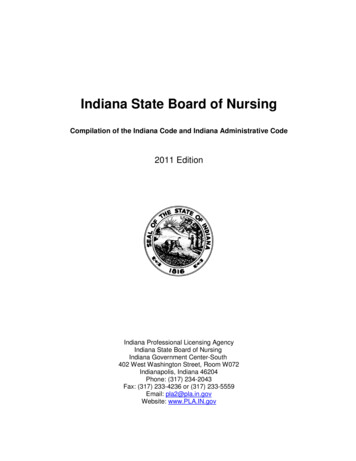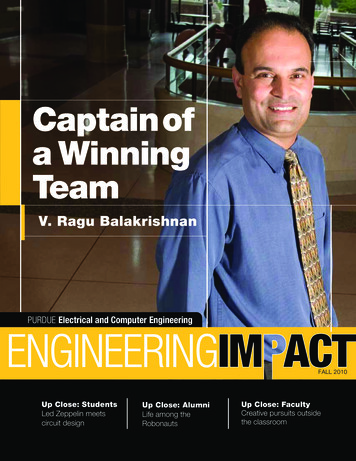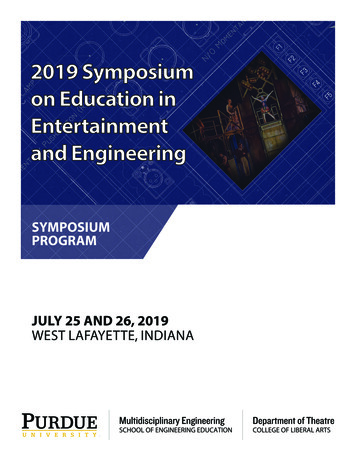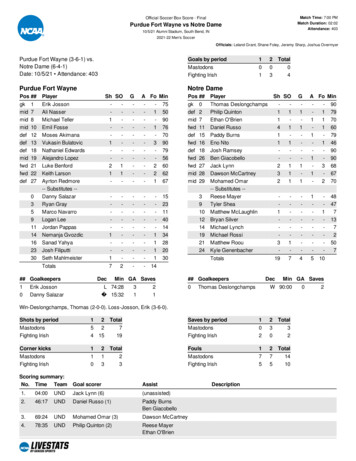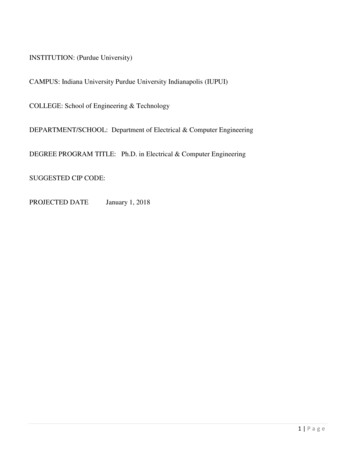
Transcription
INSTITUTION: (Purdue University)CAMPUS: Indiana University Purdue University Indianapolis (IUPUI)COLLEGE: School of Engineering & TechnologyDEPARTMENT/SCHOOL: Department of Electrical & Computer EngineeringDEGREE PROGRAM TITLE: Ph.D. in Electrical & Computer EngineeringSUGGESTED CIP CODE:PROJECTED DATEJanuary 1, 20181 Page
SIGNATURE PAGEDegree Title Ph.D. in Electrical & Computer EngineeringName of academic unit offering the new degreeDepartment of Electrical & Computer Engineering in the School of Engineering & Technology at IndianaUniversity Purdue University Indianapolis (IUPUI)Signature of Department Head(Name of Department)DateSignature of Academic Dean(Name of College/School)DateDirector of Graduate Studies(for regional campuses)Date2 Page
PURDUE BOARD OF TRUSTEESTEMPLATE FOR1-PAGE EXECUTIVE SUMMARYINTRA-AGENCY ADVISORY AND DELIBERATIVE MATERIALMEMORANDUMExecutive Summary of Upcoming Board Review or Action ItemDATE: August 15, 2016TO: Board of TrusteesFROM: Brian King, Primary Contact, (317) 274-9723 ; briking@iupui.eduSUBJECT: Submission of Proposal for a Ph.D. in Electrical & Computer Engineering at the IndianaUniversity Purdue University Indianapolis campusPurpose: This item is recommended for discussion by the Board in executive session. This item is recommended for discussion by the Committee at its meeting.XThis item will require a formal vote by the Academic Affairs Committee at its meeting. This item will require a formal vote by the Board in the Stated Meeting. This item will be presented in a formal resolution for action at the Stated Meeting.Attachments: [List any attachments to the memo as Exhibits or Appendices or note, “NoAttachments”] Appendix A Supplementary Preproposal documentationExecutive Summary (1-page) included: [Provides a high level narrative and should provide someinterpretative commentary surrounding any data or other graphical information being provided in anyattachments.]3 Page
EXECUTIVE SUMMARYPh.D. in Electrical & Computer EngineeringPurdue School of Engineering & TechnologyIndiana University-Purdue University Indianapolis,Indianapolis, INThe Purdue School of Engineering & Technology at Indiana University-Purdue UniversityIndianapolis (IUPUI) seeks to transition its current cooperative agreement for participation in the Ph.D.Program of Purdue University for Studies in the School of Electrical and Computer Engineering to an IUPUIsite-approved ECE Ph.D. degree program. The cooperative agreement entitled: “A Cooperative AgreementBetween: The Purdue School of Engineering and Technology, IUPUI and The School of Electrical andComputer Engineering, Purdue University, West Lafayette,” was approved in September 2003. The ECEDepartment at IUPUI has been successful and active in providing Ph.D. training in Indianapolis for nearly 12years and has advanced to the stage in which a site-approved program is a logical and necessary transition forfurther student and faculty success, while contributing to the economic workforce needs of the State ofIndiana.Given the experience and maturity of the IUPUI ECE Department and the success of its students, theterms and conditions of the existing cooperative agreement place unnecessary limitations on the students andthe faculty that it is intended to serve. Under the current agreement IUPUI doctoral students are required totake at least half of their courses and all dissertation credits on the West Lafayette campus. All degrees areawarded by the West Lafayette campus even though the research is conducted on the IUPUI campus andsupported by grants and awards to the faculty and students in Indianapolis. The proposed site autonomy forthe Ph.D. program in Electrical & Computer Engineering at IUPUI will facilitate an enhanced venue fordelivery of engineering research and training that will be unique and provide much needed support to thecentral Indiana community. Further, niche areas, such as the Transportation Active Safety Institute, will soonadvance to be an internationally recognized institute, such a research institute needs a site approved Ph.D.offering, in order to provide the necessary graduate student research assistants. Also, collaborations betweenECE at IUPUI and West Lafayette will be strengthened based on complimentary faculty and studentsresearch interests and objectives, rather than mandated by Ph.D. student committee compositionrequirements as specified under the current agreement. Collaborations based on complimentary researchinterests/objectives can provide greater overall benefits to both campuses, such as increased access to localindustry partners with an IUPUI collaborator available to reach out to the local industrial partner in a timelymanner; or as an enabling bridge between faculty in West Lafayette and the expanding health/medicalindustry and facilities in Indianapolis. Currently, there are no other Ph.D. engineering programs in Electricaland Computer Engineering in the metropolitan Indianapolis area and none in the region with the leadingresearch foci being pursued by the department. It is also clear that local Ph.D. training opportunities inElectrical and Computer Engineering are desired by regional employers, such as Interactive Intelligence,Raytheon, Cummins, Delphi, LHP, Rolls Royce, and NSW Crane, as well as other employers both nationallyand internationally in the research areas being pursued by the department including Toyota, Delphi, Ford,BMW, and Samsung among others.Finally, a site-approved Ph.D. in ECE will also serve the goals of IUPUI by increasing the graduateresearch and training efforts in an area that aligns with the health science-oriented commitment of the IUPUIcampus. For example, there is a strong collaboration between ECE at IUPUI and the IU School of Medicinein the area of automobile driver studies and active safety systems, including the analysis of the impact ofalcohol on driver performance. The ECE Department has a strong research program that is capable ofsupporting the proposed Ph.D. program.The ECE Department currently has 17 tenured/tenure-track faculty members who are committed tohigh quality research and teaching, with research emphasis in areas that include transportation active safety,automatic control, medical image processing, signal processing, power, renewable energy, data analytics,information intelligence, cybersecurity, and sensor technologies. Faculty research efforts have been wellfunded by various agencies including NSF (including NSF CAREER awards), NIH, and the Department ofDefense.4 Page
PROPOSALPh.D. in Electrical & Computer EngineeringPurdue School of Engineering & TechnologyIndiana University-Purdue University Indianapolis,Indianapolis, INCharacteristics of the Programa) Campus(es) Offering Program: Indiana University-Purdue University Indianapolis (IUPUI)b) Scope of Delivery Specific Sites or Statewide: IUPUIc) Mode of Delivery: Classroomd) Other Delivery Aspects: Ph.D. students will be required to participate in research and havethe option to complete internships related to their plan of study.e) Academic Unit Offering Program: School of Engineering & Technology, IUPUIf) Department: Electrical and Computer EngineeringRationale for Programa) Institutional Rationale (e.g. Alignment with Institutional Mission and Strengths)IUPUI is an urban, core research campus of Indiana University and often characterized as the State ofIndiana’s “Health & Life Sciences” campus. There has been tremendous increase in the number ofacademic programs at IUPUI. In particular, there has been significant growth in Ph.D. programs, whichreflects IUPUI’s evolution as a research university. The Purdue School of Engineering & Technologyseeks to transition from a cooperative agreement of participation in the Purdue West Lafayette ECE Ph.D.program to a site-approved doctoral degree program in Electrical & Computer Engineering at IUPUI. Thistransition reflects the vision for research development in the department with its ability to deliver qualityspecialized research as well as to mentor graduate students in these areas. Some of the niche researchareas of focus in the department include transportation active safety systems, automatic control power,renewable energy, signal processing, cybersecurity, medical imaging, data analytics, informationintelligence, and sensor technologies, especially in the context of health sciences.The proposed program will build upon the existing research strengths of the ECE Department and willleverage the resources available in Indianapolis and on the IUPUI campus in order to train the nextgeneration of Electrical and Computer Engineers and enable them to actively participate in meetingindustry demands, primarily, in Central Indiana but also in Indiana, the greater Midwest and the nation.The IUPUI campus vision is “to be the best urban research university by conducting world-class research,scholarship, and creative activities that develop knowledge and contribute to the economic growth andsocial advancement of Indiana and the nation and benefit humanity as a whole.” Engineering is essentialto IUPUI achieving this vision and a site-approved ECE Ph.D. program provides a unique opportunity forthe department to become an active participant in this vision. Missing this opportunity will certainlytranslate into the organic redistribution of advanced engineering research activities across several schools.The above-mentioned factors, together with the evolution of the IUPUI campus and changes in the localeconomy, makes an Indianapolis-based ECE doctoral program not just an aspiration but also a pressingneed in order to sustain the active participation of our department in the research and educationalenterprise of Central Indiana, the home of many engineering, information technology, life and healthsciences, and manufacturing industries.The ECE Department has been offering a site-approved MSECE degree for many years. Under the currentagreement with the ECE department at Purdue University West Lafayette (PUWL), we have Ph.D.students who are members of the ECE PUWL Ph.D. program. These students have a permanent home on5 Page
the IUPUI campus. They conduct research at IUPUI and take courses both at IUPUI and PUWL.However, the current agreement requires that the majority of their courses be taken at PUWL. In addition,admissions for the program are processed by PUWL. Despite these constraints, our PhD studentpopulation has maintained a level of more than 12 Ph.D. students over the past five years. This relativesuccess can primarily be attributed to the significant subsidy of the program by the School of Engineeringand Technology at IUPUI as well as the determination of the faculty members to making the program asuccess. Nonetheless, the lack of self-sustainability of the program has hindered its growth. Indeed, thecurrent restrictions make it difficult for the department to grow the Ph.D. program and definitely make theprogram less attractive to potential Ph.D. students for whom pursuing a Ph.D. program in Indianapolis isthe only possible option.Faculty members of the ECE Department have been successfully training Ph.D. students for several years.Even prior to the adoption of the cooperative agreement between ECE and ECE PUWL, numerous facultymembers were mentoring Ph.D. students at other universities. We have qualified faculty and nearly allhave experience with Ph.D. mentoring and training. Furthermore, the ECE department has been therecipient of many substantial and competitive research awards. For instance, two of our faculty membersare the recipient of the NSF Career Award and several have patents. Doctoral students in the ECEprogram at IUPUI also benefit from our campus membership in the NSF-sponsored consortium CIRTL,Center for Integration of Research, Teaching and Learning, which provides career development programsspecifically for STEM-focused graduate students. In order, for the ECE department to continue to beincreasingly competitive in the delivery of high quality research, the recruitment and retention of top research faculty talent, and in the provision of an environment conducive to faculty success,a high quality onsite Ph.D. program that can further stimulate the research activities on campus is anabsolute necessity.b) State RationaleOur graduate program is aligned with delivering a well-trained STEM workforce to address the needs ofthe State of Indiana. The growth of our master’s program has been realized by a large increase in studentsseeking engineering degrees in response to the employment needs of STEM related industries. Today, asubstantial percentage of our BSEE, BSCmpE and MSECE graduates are contributing to central Indiana’seconomy and industries. Indeed these alumni have been recruited in local companies such as InteractiveIntelligence, Raytheon, Cummins, LHP, Rolls Royce, NSW Crane and others.An ECE Ph.D. program in the most populous city of Indiana would be in-line with the state’s vision andmission for STEM education ion-and-goals/).Furthermore, a site-autonomous ECE Ph.D. will also support research activities in the fields of health andlife sciences and transportation/automotive in Central Indiana. Other areas that an ECE Ph.D. degreeprogram will impact include automatic control, power, renewable energy, electronics, cybersecurity,medical imaging, data analytics, and sensor technologies.Moreover, a site-autonomous ECE Ph.D. program will reduce administrative and logistics barriers forECE PhD students. For instance, under the current agreement, ECE PhD applicants from IUPUI need tocomplete 3 admission applications: one to PUWL, a second to IUPUI and a third to PUWL as a nondegree student. The latter application allows them to take the required classes at PUWL.6 Page
c) Evidence of Labor Market Needi) National, State, or Regional NeedThe enrollment in the department’s M.S. program has doubled in the last five years, primarily due togrowth in full-time students. This growing number of M.S. students have been recruited by centralIndiana industries. We believe that a large percentage of these master degree graduates, either in CentralIndiana or with ties to Central Indiana, would consider pursuing a Ph.D. program if the program wasavailable onsite. Furthermore, we believe that a PhD program in an urban area will a) allow greater faceto-face-interaction between PhD students and industry, b) promote growth in co-op opportunities forstudents and c) provide a pool of resources for industries experiencing shortage in their highly technicalworkforce. Finally, an urban PhD program is a flexible venue and will inspire surrounding industries toencourage their current employees to pursue a doctoral degree as a means for professional developmentwithout the hardship of extended leaves.ii) Preparation for Graduate Programs or Other BenefitsA Ph.D. in Electrical & Computer Engineering is a terminal degree.iii) Summary of Indiana Department of Workforce Development and/or U.S. Department of Labor DataThe US Department of Labor indicates that job outlook in hardware computer engineering and electricalengineering will achieve slight and little growth from 2014 to 2024, respectively. These are nationaltrends that may not be locally relevant. Furthermore, the report focus is on undergraduate students whichmay not be related to potential growth for graduate students with advanced technical skills. A counterexample can be observed in the two-fold increase of our own M.S. degree enrollment over the past fiveyears.iv. National, State, or Regional StudiesIn the NACE Job Outlook Survey for 2016 (National Association of Colleges and Employers) 1 , in theirjob outlook for doctoral degrees, the top five doctoral degrees for which employers expressed theirgreatest need are in order: i)Electrical Engineering, ii) Computer Science, iii)Software Engineering, iv)Computer Engineering and iv) Mechanical Engineering (with the last two tied).3) Quality and Other Aspects of the Programa) Credit Hours Required/Time to CompletionThe proposed Ph.D. program requires 90 credit hours for completion. The program is modeled after theECE Ph.D. program at Purdue West Lafayette, with few modifications that emphasize local strengths andcapabilities.The requirements described in this proposal reflect requirements for both students who have applied andwere admitted to the PhD program after having completed a Master’s degree and to those studentsadmitted directly after their undergraduate program (called Direct Admits). At any time whenrequirements for PhD students with Masters degrees differs with requirements for PhD students who areDirect Admits, then the difference will be indicated clearly.1http://www.naceweb.org/7 Page
The ECE Ph.D. program at IUPUI will primarily focus on five areas. These areas are a subset of the areasoffered in the ECE Ph.D. program at Purdue West Lafayette and consist of: Automatic Control Power and energy Communications/Signal Processing Computer Engineering VLSI and Circuit DesignStudents will choose a primary area from the above list. A minimum of 39 graduate course credit hours(non-thesis credit hours) are needed to fulfill the course requirements of the program. These courses mustinclude PhD students who are Direct Admits must complete at least 2 ECE core courses, one of which inthe primary area (see Table 1), These requirements can only be satisfied by completing the coursesta IUPUI or PUWL PhD Students admitted to the PhD program with a Masters degree must complete the core coursein their primary area (or an equivalent course) 2 ECE courses numbered 61100 or higher, and at least 18 graduate credit hours from the student’s primary area. 2 graduate mathematics courses and 3 related area courses; or 3 graduate mathematics courses and2 related area courses ECE 69401 seminar course The remaining credit hours will be satisfied by completing credit hours in ECE 69900. A PhD student will be required to take at least 1 research credit ECE 69900 each semester(excluding summer).The above requirements are summarized in Table 2 below. In addition to these requirements, ECE 69600(Advanced Projects) and ECE 69700 (Directed Reading) are not to appear on the Ph.D. plan of study andcannot be used to fulfill any of the Ph.D. requirements. Core course requirements for direct PhD admitscan only be satisfied by taking the courses at IUPUI or PUWL.Primary AreaCore CoursesAutomatic ControlECE 60200Communications/Signal ProcessingECE 60000Computer EngineeringECE 60800VLSI and Circuit DesignECE 60600 or ECE 60800PowerECE 61000Table 1: ECE core coursesMinimum Number of credit hours90Minimum number of graduate courses credit hours in ECE39Minimum number of Core courses credit hours6Minimum number of credit hours in primary area18Minimum number of ECE courses credit hours 611006Table 2: Summary of Ph.D. credit hour requirements for Direct AdmitsStudents enrolled in the Ph.D. program after the completion of a Master’s degree may be able to applysome of their Master’s degree course credits toward the Ph.D. degree. Evaluation of eligible Masterscredit hours will be conducted on a case-by-case basis by the Head of the ECE Graduate program (Chair8 Page
of the ECE Department) in consultation with the ECE Graduate Committee. A summary of therequirements in this case is shown in Table 3.Minimum Number of credit hours90*Minimum number of graduate credit hours in primary area18Minimum number of course credit hours taken after MS degree18Minimum number of ECE course credit hours 61100 taken6after MS degreeTable 3: Summary of Ph.D. credit hour requirements for student who were admitted with Mastersdegree*based on case-by-case evaluation course evaluation, some or all of the credits hours from of the Master degree may be applied towards the Ph.D. degree,Full-time status requires enrollment in 8 credit hours per semester (fall and spring). Students who areemployed 16-20 hours per week on a Student Academic Appointment are required to enroll in a minimumof 6 credit hours per semester to maintain full-time status. Typically, Ph.D. students enroll in 6-10 credithours (combined coursework and/or research credits) up through the semester in which they completetheir coursework and pass qualifying examinations. Once the student has completed all coursework,enrollment in nine-to-twelve ECE 69900 research credit hours per semester is typical. A Ph.D. studentshould be able to complete the program in 4-5 years (8-10 semesters). A sample plan of study is attached.The Doctoral Advisory Committee consists of at least four members. The primary duties of thiscommittee is to assist in the preparation of the student’s final plan of study, to advise the student duringthe course of their thesis research, and to conduct their Preliminary and Final Examinations. The MajorProfessor serves as chairperson of the Doctoral Advisory Committee.In most cases, the Major Professor and the student choose the other members who will serve with theMajor Professor on the Doctoral Advisory Committee. Membership of the committee must satisfy: The chairperson and at least two other members must be IUPUI ECE faculty members The chairperson and at least one other member should be members of the Primary Area that thestudent has declared. If two advisors guide a student’s research jointly, then it is possible to have two co-chairs onDoctoral advisory committee rather than a single chair. At least one of the co-chairs must be amember of the IUPUI ECE faculty and should be a member of the Primary Area that you havedeclared.The Qualifying Examination (QE) is a written examination required of all ECE doctoral students. It is afour-hour closed-book exam that will be offered once a year during summer (approximately two weeksbefore the start of the Fall semester). Questions on the exam are topics based; i.e., based on fundamentalarea-related topics. Each area specifies a group of at least two (2) area-approved topics which form thebasis for exam questions. Students are required to answer two (2) questions in their declared Primary Areaand one question from a Secondary Area (the Secondary area is a second area selected from the list of 5given on page 1). The fourth question may be in the Primary or Secondary area. A reading list and priorexam test questions are made available to the students. Students with an MS degree are required to takethe QE at the first offering of the exam after their entry into the PhD program. Direct PhD students musttake the QE after having completed two academic-year semesters in the program. Subsequent retakes ofthe QE must be at the next offering of the exam.There is a limit of number of times a student can take the QE. Students can take the QE two times. If astudent is not successful in passing the QE on their first two attempts, the student can appeal to the ECE9 Page
Graduate committee to take the QE a third time. If the appeal is not successful or if they fail a third timethe student would be dismissed.Each student must successfully complete the QE process, including any remedial work, before he/she ispermitted to take the PhD Preliminary Examination. During the Fall semester students will be informedof the area approved topics for the QE exam that takes place in the following summer. During the Springsemester, students expected to take the QE must confirm their participation with the ECE Department.Record the areas over which they are to be tested. The ECE Department is to be informed as soon aspossible if circumstances beyond the student’s control will cause the student to miss the exam.Performance on the examination is evaluated as follows: 70% – The QE requirement is satisfied; 60% but less than 70% – Conditional Pass with required remediation; 60% – Retake the entire exam with recommended remediation.In all cases (including Pass) the overall and individual question scores are transmitted to members of thestudent’s advisory committee. When remediation is required or recommended, the student’s advisorycommittee is to meet to propose a remediation plan. Possible options:a) Passing a specified course(s) with a grade of B or better;b) Auditing a previously taken course(s) for a set period of time (say 5-7 weeks) while assemblinga set of relevant course notes and completed homework problems;c) Other options as approved by the Graduate Committee.Option a) is the preferred option when there are individual question scores of less than 50% and/ormore than one Primary Area test question score of less than 70%.Before required remediation is initiated, it must be approved (checked for compliance with acceptedremediation activities) by the Head of the ECE Graduate Program (chair of the ECE department) and theapproved remediation is recorded by the ECE Department. When a proposed remediation consists ofsomething other than passing a course, the student’s major professor is responsible for having the studentsubmit a report of completed remediation work to the ECE Department. Although considered an unlikelyoccurrence, students have the option of retaking the QE instead of performing the required remediation.The Preliminary Examination is given to determine whether a student is adequately prepared to conceiveand undertake a suitable research topic. Students may not schedule their Preliminary Examination untilafter they have passed the Qualifying Examination and submitted their final plan of study. ThePreliminary Examination may include a written exam component, if the Doctoral Advisory Committee sorequires, but normally it is an oral examination primarily associated with a written thesis proposal.To ensure academic progress, the Preliminary Examination is to be taken by PhD students with an MSafter no more than six semesters in the PhD program and by direct PhD students after no more than eightsemesters in the program. If this deadline is not met, students must request an extension of the deadlineusing a form available in the ECE Department. The reason(s) for the delay in taking the PreliminaryExamination and specific actions planned to remedy the situation must be indicated on the form. The formmust be signed by all members of the Doctoral Advisory Committee and the Head of the ECE GraduateProgram. A completed form is required each semester past the deadline before registration for thesubsequent semester is allowed.The PhD thesis must be formatted according to Purdue Graduate School and ECE requirements. Once thethesis is prepared and all other requirements have been completed, the student must present and defend10 P a g e
his/her work in a Final Examination. The Final Examination Committee is typically just the student’sDoctoral Advisory Committee.b) Exceeding the Standard Expectation of Credit HoursNot applicable.c) Program Competencies of Learning OutcomesThe Learning Outcomes for the proposed site-approved Ph.D. degree program in Electrical and ComputerEngineering are:1. Synthesize and apply an in-depth knowledge of general fundamental concepts (e.g., signal andimage processing, communication systems, networking, wireless systems, electronic analysis anddesign methodologies, VLSI design, control systems, modern automatic control systems,multivariable and robust control, power and energy systems, energy conversion, softwareengineering, computer architecture, algorithms, programming languages, operating systems, etc.).2. Develop the mastery of Electrical and Computer Engineering in at least one sub-discipline ofElectrical and Computer Engineering.3. Integrate sub-disciplines of Electrical and Computer Engineering and other disciplines asapplicable in problem solving and research.4. Search, read and synthesize peer-reviewed literature, and apply acquired knowledge in the selectedfield of study.5. Present and communicate research results and findings to peers through international conference,posters, seminars and/or journal publications.6. Develop skills to design solid methodologies, algorithms/techniques/systems, and experiments tosolve general problems with real data.7. Develop new methodologies and systems through critical and creative thinking processes.8. Propose and conduct original research independently.9. Communicate and Defend original scholarly works.d) AssessmentFor the assessment of student applications and degree progress, the on-site ECE Ph.D. at IUPUI will bebased on the following metrics: Number of applicants and admitted students,Number of students matriculating in the program,Number of students supported by grants and other institutional sources,Academic profiles of attendees (GPAs, GRE scores, graduate degrees, previous institutionsattended, ranking in previous institution),Student performance in course work,Student research productivity (number of publications and presentations),Awards and other special recognition,Time to degree completion,Number of graduating students , andStudent placement: Number of student employed and quality of placementsMonitoring the above metrics will be the responsibilities of the Head of the ECE Graduate program (ECEdepartment chair) and the ECE Graduate Committee. Each year, in early fall, the relevant data from theprevious year will be collected and summarized. Each annual enrollee will be followed through to11 P a g e
graduation; course and research work performance will be monitored on a semester-by-semester basis. Toallow for a long-term assessment of the program, awards and job placement will be followed for three tofive years post-graduation. Ongoing regular assessment will also include the level of external researchfunding and institutional support.e) Licensure and CertificationThe Ph.D. program is not intended to prepare students for any specific licenses/certifications.f) Placement of GraduatesPh.D. students have access to career services provided by the School of E
take at least half of their courses and all dissertation credits on the West Lafayette campus. All degrees are awarded by the West Lafayette campus even though the research is conducted on the IUPUI campus and supported by grants and awards to the faculty and students in Indianapolis. The proposed site autonomy for




